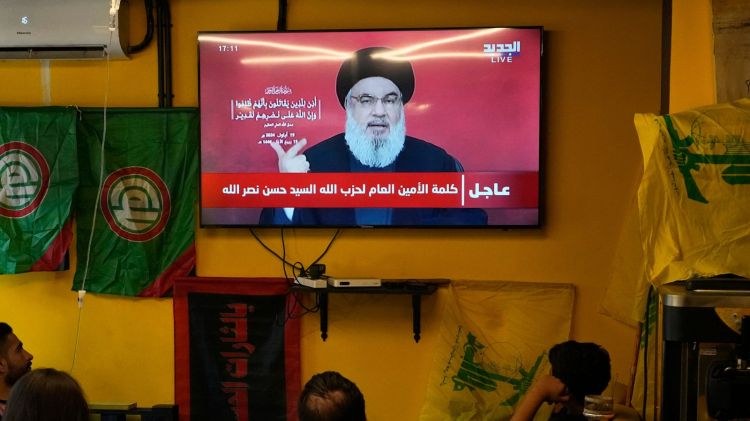Following Hezbollah leader's pledge for retaliation, Israel launches air strikes on Lebanon
Lebanese security sources report that Israeli fighter jets have targeted Hezbollah strongholds in a particularly fierce series of strikes across the region.
On Thursday, Israel carried out a significant wave of airstrikes in southern Lebanon, marking some of the most intense attacks since the commencement of hostilities with Hezbollah on October 7.
Here are 10 crucial points regarding this significant event:
The Israel Defense Forces (IDF) confirmed the destruction of over 100 rocket launchers, which were positioned for potential attacks on Israel. The launchers, located in various positions in southern Lebanon belonging to Hezbollah, were found to hold around 1,000 rocket barrels. Furthermore, multiple structures belonging to Hezbollah and a storage facility for weapons were targeted in the airstrikes.
The bombing occurred immediately following a statement made by Hezbollah's leader, Hassan Nasrallah, in which he promised retaliation for what he characterized as a string of unparalleled and lethal assaults on Hezbollah members. In his inaugural public statement following the incidents, Nasrallah alleged that Israel was behind the destruction of communication equipment utilized by Hezbollah agents across Lebanon, leading to 37 fatalities and nearly 3,000 casualties.
Nasrallah characterized the incidents as a "massacre" and cautioned Israel of impending "severe retaliation and rightful consequences." The head of Hezbollah asserted that Israel would face attacks in anticipated and unanticipated locations. Israeli fighter jets soared over Beirut, creating a sonic boom during the speaker's address. Israel's defense minister Yoav Gallant cautioned that the nation is transitioning into a "new phase in the war," signaling a shift of the conflict from Gaza to the northern border with Lebanon.
Hezbollah, supported by Iran, has aligned themselves with Hamas, the Palestinian faction central to the conflict in Gaza following the October 7th assault that resulted in the deaths of more than 1,200 individuals in Israel, predominantly civilians. The conflict has escalated into a regional confrontation, with Hezbollah carrying out daily assaults on Israeli communities along the northern border. In response, the IDF has conducted retaliatory strikes.
The exchanges of fire between Israel and Hezbollah along the border have resulted in mass evacuations, leading tens of thousands of civilians on both sides of the border to flee their homes. Communities along the northern border of Israel are currently operating under stringent military regulations. Residents have been advised to stay close to bomb shelters, avoid large gatherings, and limit their movement outside.
"In this new phase of conflict, there are significant opportunities as well as risks," stated Gallant. He also noted that Hezbollah feels targeted and will face severe consequences for their aggressive actions.
The airstrikes on Thursday were in response to a large rocket attack by Hezbollah on the northern communities of Israel. In Metula, a town located along the Lebanese border, considerable damage was reported, including the destruction of homes and the outbreak of fires caused by the rockets that were launched into the area. Israeli emergency services have confirmed no casualties occurred. US Secretary of State Antony Blinken has encouraged all parties to exercise restraint, specifically calling on Israel and Hezbollah to refrain from any actions that could exacerbate the conflict. The Biden administration is working to negotiate a ceasefire between Israel and Hamas in Gaza. They also need to address the ongoing challenge of preventing the conflict from escalating throughout the Middle East.
Lebanon's Foreign Minister Abdallah Bou Habib criticized Israel's airstrikes, labeling them as a direct attack on Lebanon's autonomy and safety. He cautioned that the intensification of the situation could potentially instigate a broader conflict in the region. Iran's Revolutionary Guards have promised a "devastating retaliation" in response to Israel's actions.

No comments:
Post a Comment